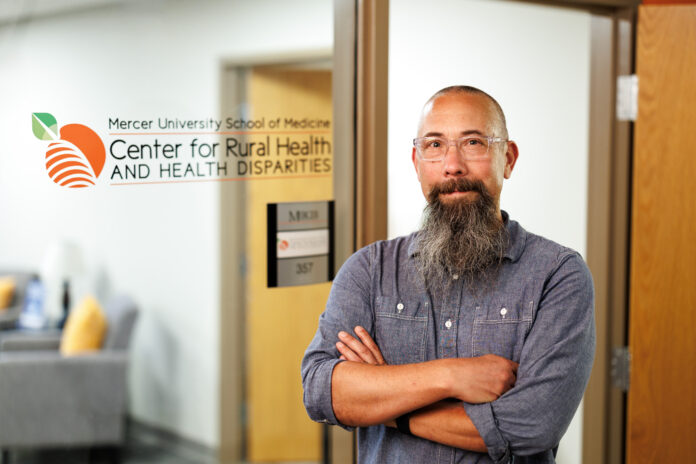MACON — Mercer University School of Medicine recently appointed Michael R. Kramer, Ph.D., as director of its Center for Rural Health and Health Disparities, one of the first National Institutes of Health Centers of Excellence to focus on rural health.
The Center for Rural Health and Health Disparities is housed within the School of Medicine and is dedicated to implementing community-driven solutions to health disparity issues in rural Georgia. The Center operates a more than $6 million federal portfolio focused on maternal and infant mortality reduction, opioid overdose prevention and chronic disease self-management.
“We are pleased to have Dr. Michael Kramer join Mercer University School of Medicine and assume the leadership role for the Center for Rural Health and Health Disparities,” said Dean Jean Sumner, M.D., FACP. “He will guide the development of strong alliances across rural Georgia and will continue the tradition of outstanding, meaningful research.”
Dr. Kramer began his career in medicine as a physician assistant, earning his Master of Medical Science from Emory University in 1997. For a decade, Dr. Kramer worked in urban and rural clinical environments, including four years at Sage Hospital of the Navajo Nation in Arizona. Dr. Kramer served as director of the emergency department there before returning to Georgia in 2004 to join the emergency department at DeKalb Medical Center. Until 2010, Dr. Kramer also served as an adjunct professor, then faculty course director in the physician assistant program at Mercer’s College of Health Professions.
In 2009, Dr. Kramer earned his Ph.D. in epidemiology from the Rollins School of Public Health at Emory University, joining the faculty shortly thereafter. At Emory, Dr. Kramer received awards for excellence in research and teaching and published more than 200 professional journal articles. His research is grounded in epidemiology as a population health science, leveraging theory and perspectives from sociology, demography and geography to understand how social processes and exposures become biologically embodied to shape population health patterns across the life course. Central to his scholarship is how individuals and families interact with local and regional health, social and economic systems to produce population health patterns.
Now, as a population health scientist, social epidemiologist and expert in maternal and child health, Dr. Kramer aims to guide community leaders and policy makers in evidence-based program and policy efforts to improve life course health trajectories and advance health equity. His work centers on the role of historical, economic and cultural attributes of rural communities in shaping health-relevant opportunities and experiences.
“I am both honored and excited to join the Mercer family,” said Dr. Kramer. “I look forward to productive and impactful research and implementation collaborations with academic and community partners seeking to maximize health and health equity in rural Georgia.”
Since 2022, the Center for Rural Health and Health Disparities was led by interim executive director Jennifer Barkin, Ph.D., who succeeded in maintaining grant funding for the South Georgia Healthy Start program.
“Dr. Barkin has done an excellent job of running the Center as interim director and will continue to manage the Healthy Start grant and other important work for MUSM and rural Georgia,” said Dr. Sumner. “I am grateful for her service in this role.”
About the Center for Rural Health and Health Disparities
Founded as one of the first two rural-focused NIH Centers of Excellence in the nation, the Center for Rural Health and Health Disparities operates numerous programs working to eliminate disparities in maternal and infant mortality, opioid overdose and chronic diseases. The CRHHD’s work is supported by the NIH’s National Institute on Minority Health and Health Disparities, the US Health Resources and Services Administration (HRSA)’s Office of Rural Health Policy and HRSA’s Maternal and Child Health Bureau.
About Mercer University School of Medicine (Macon, Savannah, Columbus and Valdosta)
Mercer University’s School of Medicine was established in 1982 to educate physicians and health professionals to meet the primary care and health care needs of rural and medically underserved areas of Georgia. Today, more than 60% of graduates currently practice in the state of Georgia, and of those, more than 80 percent are practicing in rural or medically underserved areas of Georgia. Mercer medical students benefit from a problem-based medical education program that provides early patient care experiences. Such an academic environment fosters the early development of clinical problem-solving and instills in each student an awareness of the place of the basic medical sciences in medical practice. The School opened additional four-year M.D. campuses in Savannah in 2008 and in Columbus in 2021, and a clinical campus in Valdosta in 2024. Following their second year, students participate in core clinical clerkships at the School’s primary teaching hospitals: Atrium Health Navicent The Medical Center and Piedmont Macon Medical Center in Macon; Memorial Health University Medical Center in Savannah; Piedmont Columbus Regional Hospital and St. Francis Hospital in Columbus; and SGMC Health in Valdosta. The School also offers master’s degrees in preclinical sciences and family therapy and Ph.Ds. in biomedical sciences and rural health sciences.










